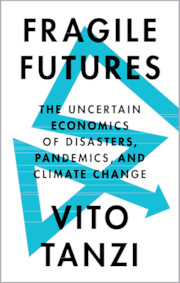Book contents
- Fragile Futures
- Fragile Futures
- Copyright page
- Contents
- Acknowledgments
- Epigraph
- Part I Uncertain Future Events and Reactions to Them
- Part II Pandemics and Other Disasters
- 5 Pandemics, Plagues, and Epidemics
- 6 Famines
- 7 Natural Disasters
- 8 Atomic Disasters
- 9 Industrial Disasters
- 10 Guiding Economic Principles for Disasters
- Part III Climate Change and Global Warming
- Part IV Back to Some Theoretical Issues
- References
- Index
10 - Guiding Economic Principles for Disasters
from Part II - Pandemics and Other Disasters
Published online by Cambridge University Press: 28 April 2022
- Fragile Futures
- Fragile Futures
- Copyright page
- Contents
- Acknowledgments
- Epigraph
- Part I Uncertain Future Events and Reactions to Them
- Part II Pandemics and Other Disasters
- 5 Pandemics, Plagues, and Epidemics
- 6 Famines
- 7 Natural Disasters
- 8 Atomic Disasters
- 9 Industrial Disasters
- 10 Guiding Economic Principles for Disasters
- Part III Climate Change and Global Warming
- Part IV Back to Some Theoretical Issues
- References
- Index
Summary
Description: The many disasters that have often visited humans in the past did not seem to have influenced the economic thinking that developed, mostly in the nineteenth and in the first part of the twentieth century. While “risky” events had some impact and led to the development of the insurance industry and to some government policies, “uncertain” events did not. They continued to be ignored by both theory and policy, and were considered “Acts of God.” The main assumption, which has continued to guide economic theory and policy, has been that of a smoothly functioning economy, more recently, with some recognition of the existence of business cycles. <break>However, bad but “uncertain” events, such as pandemics and major disasters, have continued to make unwelcome visits. When they have come, they have created major difficulties and confusion on how to deal with them. <break>Current examples of such events are the Covid 19 pandemic and, increasingly, global warming. There is still no preparation for future pandemics and no clear strategy on what to do about global warming. The longer that life expectancy enjoyed by many individuals has become, the greater is the probability that they will experience these problems during their lifetime.
Keywords
- Type
- Chapter
- Information
- Fragile FuturesThe Uncertain Economics of Disasters, Pandemics, and Climate Change, pp. 125 - 130Publisher: Cambridge University PressPrint publication year: 2022

